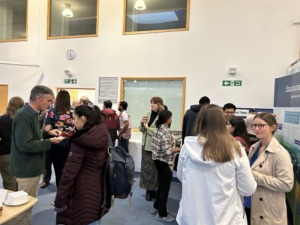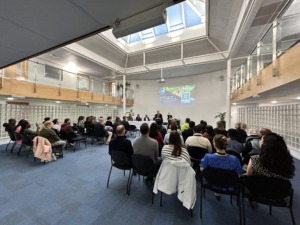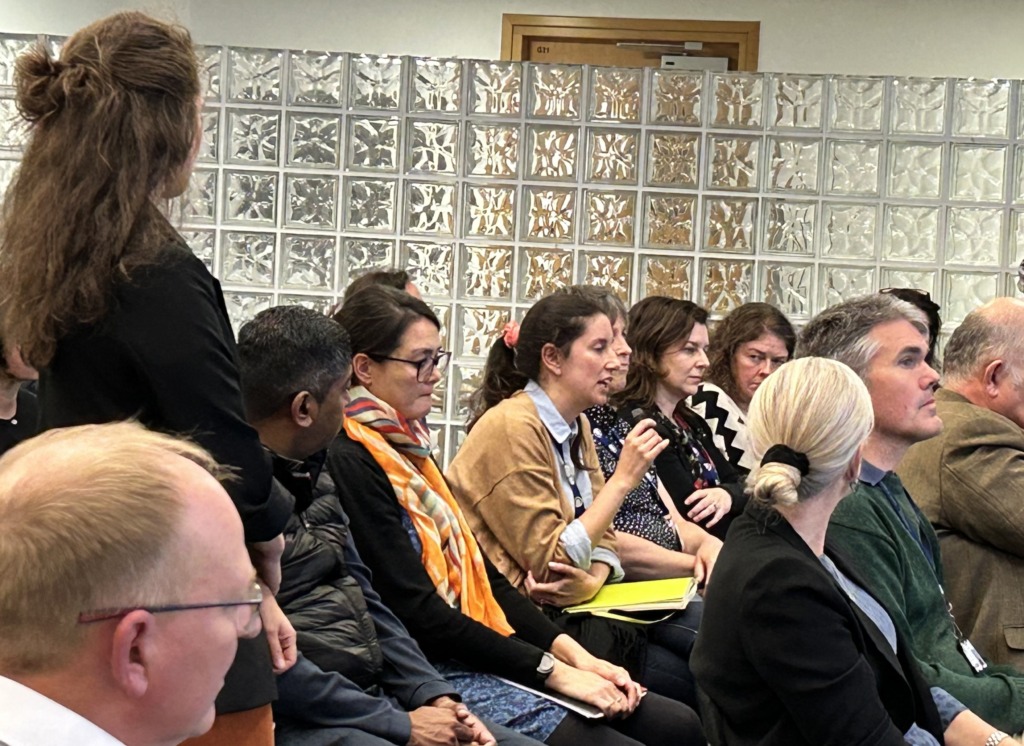“The Transformational Power of Food”: Discussing Our Two Favourite Topics – Food & Sustainability
08/11/2023

The recent panel discussion organised by Cranfield University’s Sustainability Network unearthed an exploration into how sustainability and net zero is driving innovation in the food sector. Attended by a diverse audience, including students, faculty, local business people, and food industry professionals from outside the university, the event provided a unique platform for an inclusive and comprehensive dialogue.
My favourite part of the night was when we got to speak with the panel speakers outside of the session, introducing ourselves and passionately discussing our shared enthusiasm for sustainability. Over drinks and snacks in an informal networking setting, the connections we fostered underscored the power of collaboration and the collective drive for a greener future.
Interdisciplinary Learning and Food Systems Thinking
Rosina Borelli, a passionate Ph.D. student and an advocate for holistic education in sustainable food systems, brought forth a compelling argument for the necessity of interdisciplinary learning. Her passionate dedication to instilling food systems thinking among students emphasised the critical role of comprehensive education in shaping a sustainable future.
Paul Burgess, a seasoned professor of Sustainable Agriculture, delivered a heartfelt call to action, shedding light on the need for collaborative efforts and diverse skill sets required to profitably achieve net-zero goals in the food sector. His profound insights not only highlighted the challenges but also illuminated the immense possibilities within the realms of sustainable agriculture.
Taste and Sustenance
Zbigniew Lewicki, with his global experience in the food industry across purpose-led brands such as Unilever, Lipton, Knorr and Magnum, captivated the audience with his emphasis on the intricate connection between delectable food and sustainable practices. He mentioned a key learning from experience bringing together the art and science of cooking: “the only way to change anything in the food system is to offer delicious food.”
As he unveiled the art of balancing culinary delight with environmental consciousness, he underscored the transformative potential embedded within various sub-sectors. Here are two aspects that stood out for me:
Circular economy: The food and agriculture industry currently emits approximately 13 billion tons of carbon. With the potential of achieving net-zero soon, around 700 to 800 billion tons of carbon economy could be redirected, prompting us to explore new valuable economic avenues.
AI in the food sector: While the global food industry generates $9.4 trillion annually, the health & pharma sector, with $8.3 trillion, receives nearly nine times more AI capital investment compared to agriculture, indicating significant untapped potential for AI-driven advancements in the food industry.
Importance of Farm-Level Data in Food Transformation
Oliver Rubinstein, through his insightful discourse on data innovation at the farm level, unravelled the complexities surrounding accurate carbon emission data. His introduction of Sandy, a revolutionary software solution designed to bridge the gap between emissions reporting and actionable sustainable practices, ignited a sense of hope and empowerment among the audience.
The discussions resonated with the audience, highlighting the paramount significance of embracing comprehensive natural capital accounting. The emphasis on accessible tools and user-friendly software underscored the critical role of technology in empowering farmers and facilitating the widespread adoption of sustainable practices within the food industry.
In the wake of the event, a collective realisation dawned upon the attendees, emphasising the intrinsic harmony between sustainability and taste. As the discussions drew to a close, the resounding message of shared responsibility echoed through the hall, leaving an indelible mark on each participant, igniting a collective commitment to shaping a sustainable and delectable future for the food industry.
Engagement With the Speakers
The session culminated with a Q&A session, where students and external visitors passionately posed thought-provoking questions to the esteemed panel of experts. The interactive exchange not only deepened the understanding of the intricate issues at hand but also fostered a sense of collaboration and shared responsibility among all participants, further fuelling the drive for sustainable practices and innovation within the food industry.
Lastly, I’d like to extend my heartfelt gratitude to Cranfield University for orchestrating this insightful event and fostering a community-driven dialogue, helping us correlate our class learning with industrial practices.
See the full recording of the event here
Learn more about our upcoming Sustainability events
Categories & Tags:
Leave a comment on this post:
You might also like…
From classroom to cockpit: What’s next after Cranfield
The Air Transport Management MSc isn’t just about learning theory — it’s about preparing for a career in the aviation industry. Adit shares his dream job, insights from classmates, and advice for prospective students. ...
Setting up a shared group folder in a reference manager
Many of our students are now busy working on their group projects. One easy way to share references amongst a group is to set up group folders in a reference manager like Mendeley or Zotero. ...
Company codes – CUSIP, SEDOL, ISIN…. What do they mean and how can you use them in our Library resources?
As you use our many finance resources, you will probably notice unique company identifiers which may be codes or symbols. It is worth spending some time getting to know what these are and which resources ...
Supporting careers in defence through specialist education
As a materials engineer by background, I have always been drawn to fields where technical expertise directly shapes real‑world outcomes. Few sectors exemplify this better than defence. Engineering careers in defence sit at the ...
What being a woman in STEM means to me
STEM is both a way of thinking and a practical toolkit. It sharpens reasoning and equips us to turn ideas into solutions with measurable impact. For me, STEM has never been only about acquiring ...
A woman’s experience in environmental science within defence
When I stepped into the gates of the Defence Academy it was the 30th September 2019. I did not know at the time that this would be the beginning of a long journey as ...










Comments are closed.